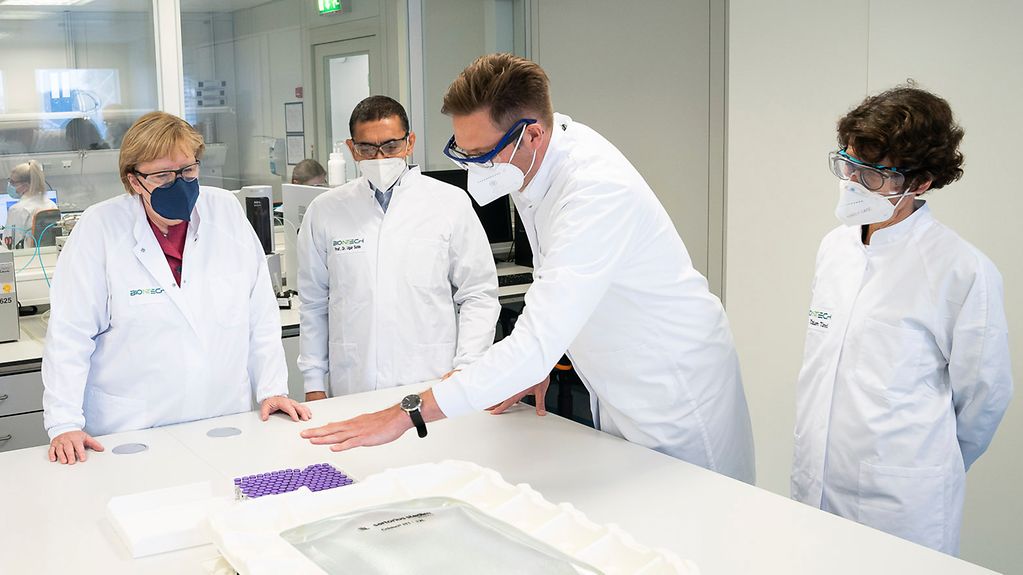The Federal Chancellor visits vaccine production
Behringwerke Marburg Industrial Park is one of the world’s largest locations for the production of mRNA vaccines in the fight against the COVID-19 pandemic. Federal Chancellor Merkel gained first-hand insights into the production of the BioNTech vaccine. Previously she had visited two scientific museums in Giessen.
3 min reading time

Federal Chancellor Merkel learned about BioNTech’s vaccine production in Marburg.
Photo: Federal Government/Kugler
On a visit to the BioNTech vaccine production facility, Federal Chancellor Angela Merkel urged everyone who has not yet been vaccinated to take the opportunity to get the coronavirus vaccine. “I would like to call on everyone who has not yet been vaccinated to protect themselves and others,” Merkel said. She added that, thanks to production at the Marburg facility, sufficient quantities of the vaccine were now available for everyone to take up this offer.
Merkel: “A trademark for Germany”
Along with the firm’s founder and current chairman of the board Professor Uğur Şahin and chief medical officer Dr. Özlem Türeci, the Federal Chancellor viewed parts of the Behringwerke production facility for the coronavirus vaccine. The tour of the facility focused on quality control and the logistics of vaccine production. The Federal Chancellor’s visit concluded with a discussion with employees of the pharmaceutical company. Merkel stressed that BioNTech’s production of the coronavirus vaccine was “a trademark for Germany”.
“We have been given an insight into the complex production process,” said the Federal Chancellor. “These products may not look spectacular, but their effect certainly is.” Merkel rated BioNTech’s success as confirmation of how important it is to invest in research and development. Thanks to decades of research, the company had discovered how “we can find our way out of the pandemic,” Merkel said, adding that this opportunity should be made available to as many people as possible around the world.
Getting to grips with science
On her way to central Hesse, Merkel stopped off in Giessen, where she visited the Liebig Museum and the Mathematikum. Professor Eduard Alter, chairman of the Julius Liebig Society, took the Federal Chancellor on a tour of the various laboratories where scientists had carried out the research that helped establish the discipline of organic chemistry during the 19th century.
Following her visit, the Federal Chancellor said, “Over the next few days I will be going on a number of trips focusing on science and its applications, particularly its application in medicine. Thanks to Professor Alter and his colleagues, I have got to know the Liebig Museum. It really is a treasure trove, a gem of historic significance.” Merkel described how Justus von Liebig had developed organic chemistry and made the teaching of chemistry vivid, effectively taking it directly from the lecture to the experiment.
Justus von Liebig’s idea of using his evening lectures to inspire a wide audience about the sciences had contributed to Germany’s strength as a hub for business and industry, Merkel noted. “Excellent research, high levels of experimental skill and capacity for innovation, all linked to practical applications: that is essentially what creates our prosperity,” Merkel stressed.
The Liebig Museum is Justus von Liebig’s historic laboratory, where the chemist worked between 1824 and 1852. Almost unchanged after all this time, it is one of the most important museums for the history of chemistry.
Mathematics you can get your hands on
A few steps away from the Liebig Museum is the Mathematikum, where around 170 exhibits spread over 1,200 square metres bring mathematics to life in a playful way. The interactive museum was founded at the turn of the millennium by Professor Albrecht Beutelspacher, who took the Federal Chancellor on a tour of the exhibition. Professor Beutelspacher taught Geometry and Discrete Mathematics at the Justus Liebig University from 1988 to 2018.
“For most people, mathematics is not something that can be picked up and held. For them it is more about ruminating, writing out formulae and solving geometry problems,” according to the Federal Chancellor, noting how the Mathematikum made maths tangible. “I was able to observe families experimenting and I think this is a wonderful place to think about maths, not just for children, but their parents, too.”
The Mathematikum was opened by the then Federal President Johannes Rau in 2002. Here, visitors experience mathematics as something get to grips with. Specially for visitors aged between three and eight, there is the Mini-Mathematikum. Here, the core principles of mathematics – “Numbers”, “Shapes” and “Patterns” – can be experienced in many different ways.